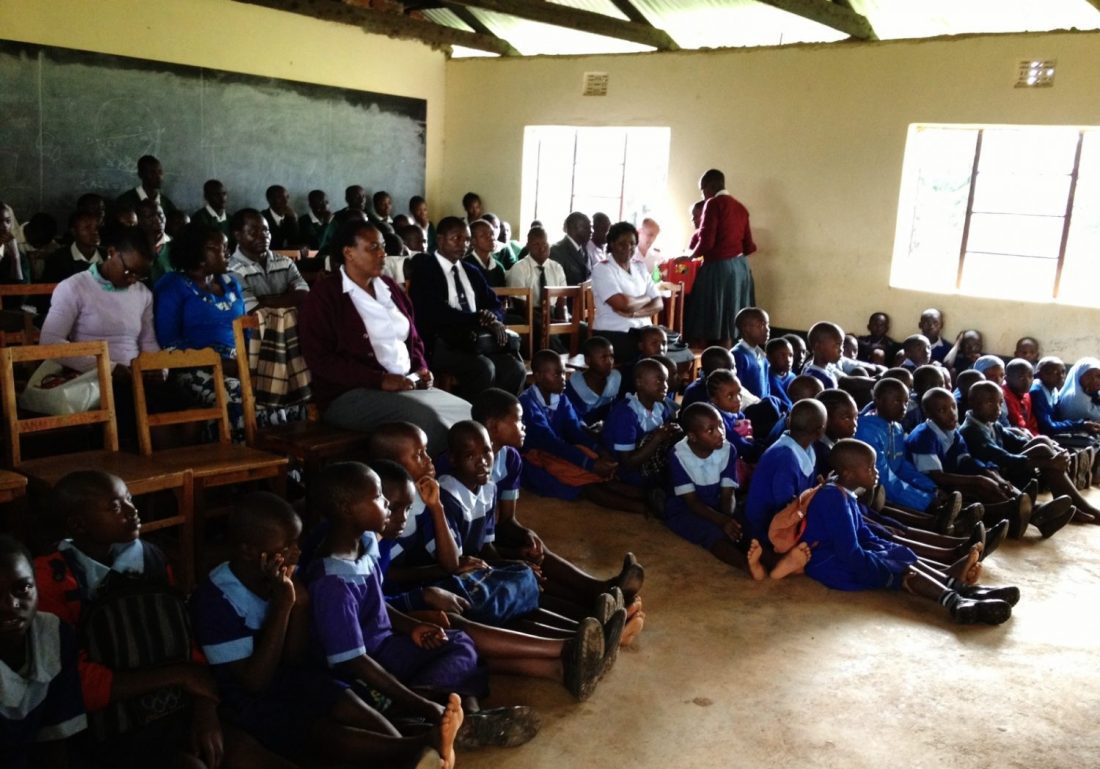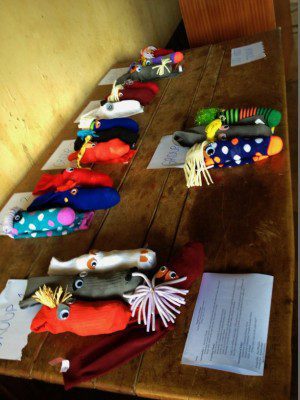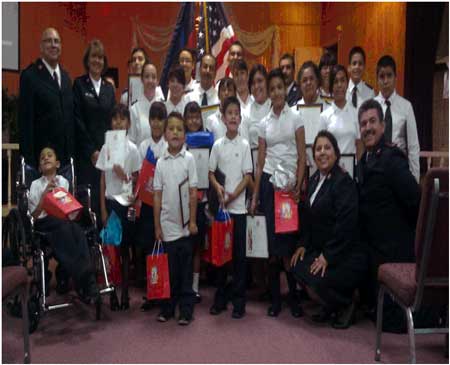Listen to this article
Listen to this article
Loading
Play
Pause
Options
0:00
-:--
1x
Playback Speed- 0.5
- 0.6
- 0.7
- 0.8
- 0.9
- 1
- 1.1
- 1.2
- 1.3
- 1.5
- 2
Audio Language
- English
- French
- German
- Italian
- Spanish
Open text
practice by puppetry. the salvation army is helping students in kenya tap into their right-brain potential, improve their english and overcome stage fright—all through puppets. sixty students at kakamega township secondary school in kakamega, kenya, put on a show for over 200 individuals, using 20 sock puppets and a wooden puppet stage built by inmates of the local prison. through a series of skits, the students addressed issues relevant to their culture and community. the performance was the culmination of “puppets for a purpose,” a project developed by salvationist and college student jessica hodder that uses puppet theatre as a tool for community bonding and education. “theatre can be used to explore a number of social, economic and cultural issues within a wide variety of cultural, political and socio-economic contexts,” hodder said. hodder brought the project to kakamega township secondary school, which is sponsored by the salvation army. the school, which was established in 2005,educates 385 students each year. over two weeks, participating students worked in groups to create skits addressing different community issues, including drug addiction, theft, teenage pregnancy, conflict over land and peer pressure. during the rehearsal process, the students sorted through their respective issues and determined how best to present them to the community. “this is the best method that we can use to teach people in our community about issues that are affecting us,” said student puppeteer samuel kaduki. as the students worked to make the skits both relatable and realistic, the process also enhanced their teamwork skills and challenged them to analyze their daily issues. several secondary school students expressed a desire to put on more puppet shows in the future, specifically to address hiv/aids and other communicable diseases within the area. “puppetry has helped us to cope with various life situations,” said student puppeteer ellie oyogi. faculty and staff also expressed support for the project. “in the rural areas, we normally spread awareness of community issues through traditional teaching,” said george busolo, the math and chemistry teacher at kakamega township. “but when you teach with an illustration…with a model like a puppet, the issues are well-communicated. i…trust that we, being the first institution within the western kenya region to use puppetry, will be able to educate more students to use the puppets to communicate all of the ideas that they have concerning our communities.”. frederick jacob tali, principal of kakamega township, echoed busolo’s sentiment. “theatre, and indeed puppetry, is new in western kenya,” tali said. “puppetry is successful because it combines learning with fun, and it makes students more active and participatory in the learning process. it also promotes peer teaching, because the students share with each other as they perfect their skills. i’m sure that if we continue to refine our skills using the new stage and puppets, other schools will learn and the trend will spread.”. hodder hopes that puppetry will inspire those in rural areas to breathe life into their stories, and create effective spaces for learning in the process. “by playing upon africa’s deeply rooted appreciation of stories and storytelling, this performance project proved successful in first appealing to community members and then addressing pertinent societal concerns,” hodder said. “i am looking forward to seeing how kakamega township secondary school utilizes the stage and puppets in the future.”.
Open context player
Close context player
Plays:-Audio plays count
practice by puppetry. the salvation army is helping students in kenya tap into their right-brain potential, improve their english and overcome stage fright—all through puppets. sixty students at kakamega township secondary school in kakamega, kenya, put on a show for over 200 individuals, using 20 sock puppets and a wooden puppet stage built by inmates of the local prison. through a series of skits, the students addressed issues relevant to their culture and community. the performance was the culmination of “puppets for a purpose,” a project developed by salvationist and college student jessica hodder that uses puppet theatre as a tool for community bonding and education. “theatre can be used to explore a number of social, economic and cultural issues within a wide variety of cultural, political and socio-economic contexts,” hodder said. hodder brought the project to kakamega township secondary school, which is sponsored by the salvation army. the school, which was established in 2005,educates 385 students each year. over two weeks, participating students worked in groups to create skits addressing different community issues, including drug addiction, theft, teenage pregnancy, conflict over land and peer pressure. during the rehearsal process, the students sorted through their respective issues and determined how best to present them to the community. “this is the best method that we can use to teach people in our community about issues that are affecting us,” said student puppeteer samuel kaduki. as the students worked to make the skits both relatable and realistic, the process also enhanced their teamwork skills and challenged them to analyze their daily issues. several secondary school students expressed a desire to put on more puppet shows in the future, specifically to address hiv/aids and other communicable diseases within the area. “puppetry has helped us to cope with various life situations,” said student puppeteer ellie oyogi. faculty and staff also expressed support for the project. “in the rural areas, we normally spread awareness of community issues through traditional teaching,” said george busolo, the math and chemistry teacher at kakamega township. “but when you teach with an illustration…with a model like a puppet, the issues are well-communicated. i…trust that we, being the first institution within the western kenya region to use puppetry, will be able to educate more students to use the puppets to communicate all of the ideas that they have concerning our communities.”. frederick jacob tali, principal of kakamega township, echoed busolo’s sentiment. “theatre, and indeed puppetry, is new in western kenya,” tali said. “puppetry is successful because it combines learning with fun, and it makes students more active and participatory in the learning process. it also promotes peer teaching, because the students share with each other as they perfect their skills. i’m sure that if we continue to refine our skills using the new stage and puppets, other schools will learn and the trend will spread.”. hodder hopes that puppetry will inspire those in rural areas to breathe life into their stories, and create effective spaces for learning in the process. “by playing upon africa’s deeply rooted appreciation of stories and storytelling, this performance project proved successful in first appealing to community members and then addressing pertinent societal concerns,” hodder said. “i am looking forward to seeing how kakamega township secondary school utilizes the stage and puppets in the future.”.
Listen to this article



















